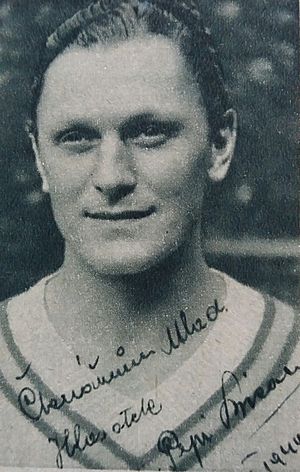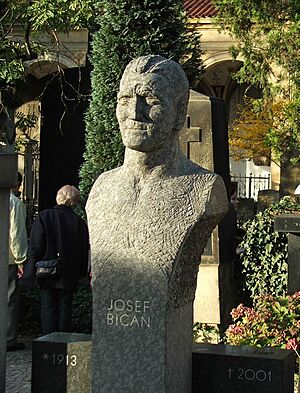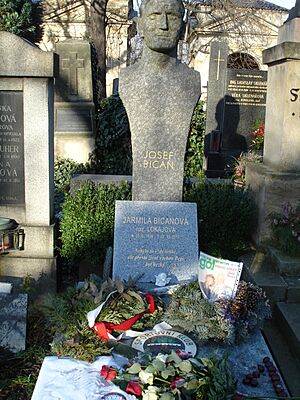Josef Bican facts for kids
 |
|||
| Personal information | |||
|---|---|---|---|
| Full name | Josef Bican | ||
| Date of birth | 25 September 1913 | ||
| Place of birth | Vienna, Austria-Hungary | ||
| Date of death | 12 December 2001 (aged 88) | ||
| Place of death | Prague, Czech Republic | ||
| Position(s) | Striker | ||
| Youth career | |||
| 1928–1930 | Schustek | ||
| 1930–1931 | Farbenlutz | ||
| Senior career* | |||
| Years | Team | Apps | (Gls) |
| 1931–1935 | Rapid Vienna | 64 | (81) |
| 1935–1937 | Admira | 26 | (17) |
| 1937–1948 | Slavia Prague | 211 | (403) |
| 1948–1951 | FC Vítkovice | 69 | (93) |
| 1951–1952 | FC Hradec Králové | 26 | (53) |
| 1952–1955 | Dynamo Prague | 31 | (22) |
| Total | 416+ | (651+) | |
| International career | |||
| 1933–1936 | Austria | 19 | (14) |
| 1938–1949 | Czechoslovakia | 14 | (12) |
| 1939 | Bohemia and Moravia | 1 | (3) |
| Managerial career | |||
| 1954–1956 | Slavia Prague | ||
| 1956–1959 | TJ Slovan Liberec | ||
| 1957–1958 | Spartak Brno ZJŠ | ||
| 1959–1960 | TJ Spartak ZJS Brno | ||
| 1963–1964 | TJ Baník Příbram | ||
| 1964 | FC Hradec Králové | ||
| 1967–1969 | SONP Kladno | ||
| 1969–1972 | KSK Tongeren | ||
| 1977 | Benešov | ||
| *Club domestic league appearances and goals | |||
Josef "Pepi" Bican (born September 25, 1913 – died December 12, 2001) was an amazing football player from Austria and the Czech Republic. He played as a striker, which means his main job was to score goals. Many people consider him one of the best goal scorers in football history.
According to the Rec.Sport.Soccer Statistics Foundation (RSSSF), Josef Bican scored over 948 goals in 621 official matches. This makes him one of the top goal scorers ever! Even FIFA, the world football organization, recognizes he scored at least 805 goals. He scored over 1812 goals in all matches he played, which is an incredible number.
Bican started his professional football journey with Rapid Vienna in 1931. He played for several clubs in Austria and then moved to Slavia Praha in 1937. He became the top goal scorer for Slavia Prague. He also played for other teams like FC Vitkovice and FC Hradec Králové. He retired from playing in 1955. He is known as the top goal scorer in the history of the Czechoslovak First League, with 447 goals.
Josef Bican was part of Austria's famous "Wunderteam" in the 1930s. He played for Austria in the 1934 FIFA World Cup, where his team reached the semi-finals. Later, he also played for the Czechoslovakia national football team. He was a tall player who could use both feet well and was very fast. It's said he could run 100 meters in just 10.8 seconds, which was almost as fast as top sprinters of his time!
After he stopped playing, Bican became a football manager. He coached different teams from the 1950s to the 1970s. In 1998, he received a "Medal of Honour" for being one of the world's most successful goal scorers. In 2000, he was given the "Golden Ball" award. This award recognized him as the greatest goal scorer of the 20th century. He earned it by being the top scorer in his league 12 times, more than any other player!
Contents
Early Life and First Steps in Football
Josef Bican was born in Vienna, Austria. His father, František, was also a football player. Sadly, his father died when Josef was only 8 years old from a kidney injury he got playing football. Josef's mother worked hard in a restaurant kitchen to support the family.
Because his family was poor, Josef often played football without shoes. This actually helped him become very good at controlling the ball! He went to a Czech school in Vienna. When he was 12, he started playing for a junior team called Hertha Vienna II. At 18, a big club, Rapid Vienna, noticed his talent and signed him.
Amazing Club Career
When Josef Bican joined Rapid Vienna in 1931, he earned 150 Austrian shillings. By the time he was 20, he was so good that Rapid paid him 600 shillings to keep him!
In 1937, Bican moved to the Czech club Slavia Prague. He played for Slavia during World War II. While many other players were fighting in the war, Bican continued to play football. He scored an incredible 328 goals in eight league seasons for Slavia. In one amazing season, he scored 57 goals in just 26 matches!
Bican even scored seven goals in a single game three times in his career. For example, in a 1939–40 match against Zlín, he scored seven goals as Slavia won 10–1. He did it again the next season against Zlín, scoring seven goals in a 12–1 victory. His third seven-goal game was in 1947–48, when Slavia beat České Budějovice 15–1.
Throughout his 27-year career, Bican was the top scorer in his league 12 times. He was also Europe's top scorer for five years in a row, from 1939–40 to 1943–44.
After the war, Bican joined a steel works team called Železárny Vítkovice. In 1952, he moved to FC Hradec Králové, where he scored 53 goals in 26 matches. However, because of the political situation at the time, he was forced to leave the city and the club in 1953. He then returned to Slavia Prague, which was known as Dynamo Prague back then. He finally stopped playing football in 1955, at the age of 42. He was the oldest player in the league when he retired.
International Matches
On November 29, 1933, when he was 20 years old, Josef Bican played his first international match for Austria. It was a 2–2 draw against Scotland. He then played for Austria in the 1934 FIFA World Cup. Austria's team, called the "Wunderteam" (meaning "Wonder Team"), reached the semi-finals. Bican scored one goal in that tournament during Austria's 3–2 win over France.
Later, Bican wanted to play for Czechoslovakia. He became a Czechoslovak citizen. However, a mistake in the paperwork meant he couldn't play in the 1938 FIFA World Cup. In total, he scored 29 goals in 34 international matches for three different teams: Austria, Czechoslovakia, and Bohemia & Moravia. His last international game was for Czechoslovakia in 1949.
Sometimes, other players on the team became a bit jealous of Bican's success. But he kept scoring goals! Besides playing for national teams, Bican also played in special games for teams made up of the best players from different leagues or cities. He scored many goals in these matches too, adding to his amazing goal count.
Life After Playing Football
In 1968, Josef Bican was allowed to coach football teams outside his home country. He impressed a Belgian team called Tongeren and became their coach. He helped them move up from Division 4 to Division 2, which was a great success!
Around this time, the famous Brazilian player Pelé was about to score his 1000th goal. Many reporters started looking for other players who had scored a thousand goals. Another Austrian player, Franz Binder, mentioned Bican, saying he had scored over 5000 goals in all competitions! When reporters asked Bican why he didn't talk more about his goals, he simply said, "Who would have believed me if I said I'd scored five times as many goals as Pelé?"
While Bican's total goals are often compared to Pelé's, it's important to remember that Bican scored over 948 goals in official matches. His amazing goal-scoring record is sometimes overlooked because he didn't seek a lot of media attention.
Just before he passed away in 2001, the International Federation of Football History & Statistics (IFFHS) named Bican the most successful goal scorer of the 20th century. This was based on him being the top scorer in his domestic league 12 times, more than any other player in football history!
In the 1990s, Bican talked about how scoring goals is always the same, no matter the era. He said, "When I talk to young reporters, they always say, 'Mr Bican, scoring was easier back in your day.' But I ask them, 'How come? Look, are there opportunities today?' And they tell me, 'Of course there are, many of them'. And I say, 'There you go. If there weren’t opportunities, it would be difficult. But if there are, scoring is the same as it was a hundred years ago, and will be the same in a hundred years’ time, too. It will always be the same.”
Josef "Pepi" Bican spent his last few months in the hospital due to heart problems. He passed away on December 12, 2001, at the age of 88. In September 2013, on what would have been his 100th birthday, his former club Slavia Prague honored him by wearing special shirts with his signature on them.
Images for kids
See also
 In Spanish: Josef Bican para niños
In Spanish: Josef Bican para niños
 | Sharif Bey |
 | Hale Woodruff |
 | Richmond Barthé |
 | Purvis Young |




